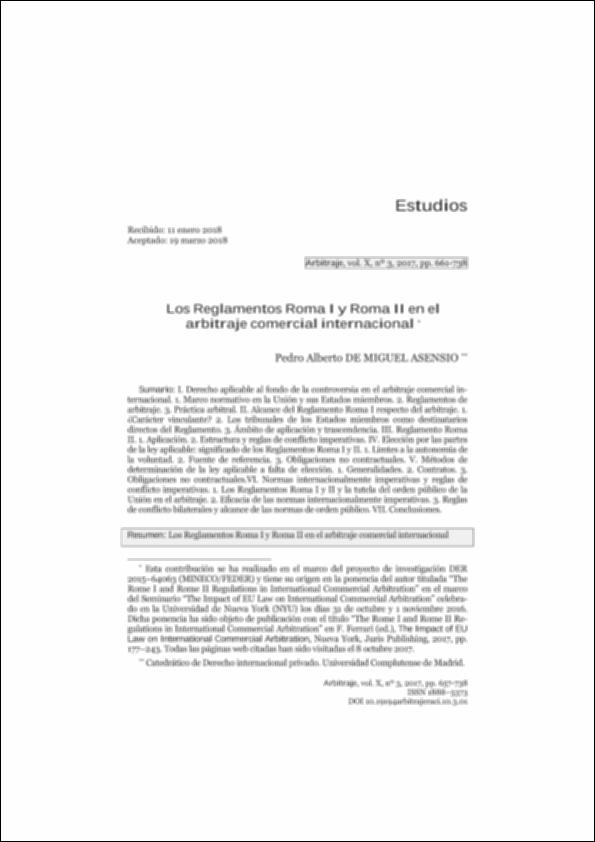Please use this identifier to cite or link to this item:
http://hdl.handle.net/10637/12511Los Reglamentos Roma I y Roma II en el arbitraje comercial internacional.
| Title: | Los Reglamentos Roma I y Roma II en el arbitraje comercial internacional. |
| Authors : | Miguel Asensio, Pedro Alberto de |
| Keywords: | Arbitraje comercial.; Ley aplicable.; Contratos.; Obligaciones extracontractuales.; Commercial arbitration.; Choice of law.; Contracts.; Non-contractual obligations. |
| Abstract: | El criterio de que los tribunales arbitrales, incluso con sede en un Estado miembro de
la Unión, a diferencia de los tribunales estatales, no se hallan directamente vinculados por
los Reglamentos Roma I y II, no excluye que estos instrumentos puedan desempeñar un
papel muy significativo en la determinación de la ley aplicable a los contratos por los
árbitros en virtud del marco regulatorio al que los árbitros están sometidos y de los métodos
por ellos utilizados a tal fin. Se trata de instrumentos relevantes en múltiples situaciones,
por ejemplo, cuando los árbitros adoptan un método basado en el recurso a principios
generales de Derecho internacional privado o recurren al llamado método cumulativo
para determinar la regla de conflicto apropiada. Además, sus disposiciones sobre leyes
de policía y orden público pueden resultar de singular interés en relación con el deber de
los árbitros de esforzarse por adoptar un laudo susceptible de ejecución. Unlike national courts, arbitral tribunals seated in an EU Member State are not directly bound by the Rome I and Rome II Regulations. This view does not undermine that these instruments may play a significant role in the determination of the law applicable to the substance by arbitral tribunals in the light of the current regulatory framework and the methods used by arbitrators. Those instruments influence arbitral decisions in many situations, for instance, where arbitrators adopt the general principles of choice– of–law method or the so–called cumulative method to establish the law applicable to the dispute. Moreover, their provisions on mandatory rules and public policy may become particularly relevant with regard to the arbitrators’ concerns to render an enforceable award. |
| Description: | En: Arbitraje: revista de arbitraje comercial y de inversiones. eISSN. 2603-9281. vol. 10, n. 3, 2017, pp 661-738 |
| URI: | http://hdl.handle.net/10637/12511 |
| Rights : | http://creativecommons.org/licenses/by-nc-nd/4.0/deed.es |
| Issue Date: | 19-Mar-2018 |
| Appears in Collections: | 2017 Arbitraje nº 3 |
Items in DSpace are protected by copyright, with all rights reserved, unless otherwise indicated.


